单元整体教学Unit2 How often do you exercise学历案(含答案)
文档属性
| 名称 | 单元整体教学Unit2 How often do you exercise学历案(含答案) | 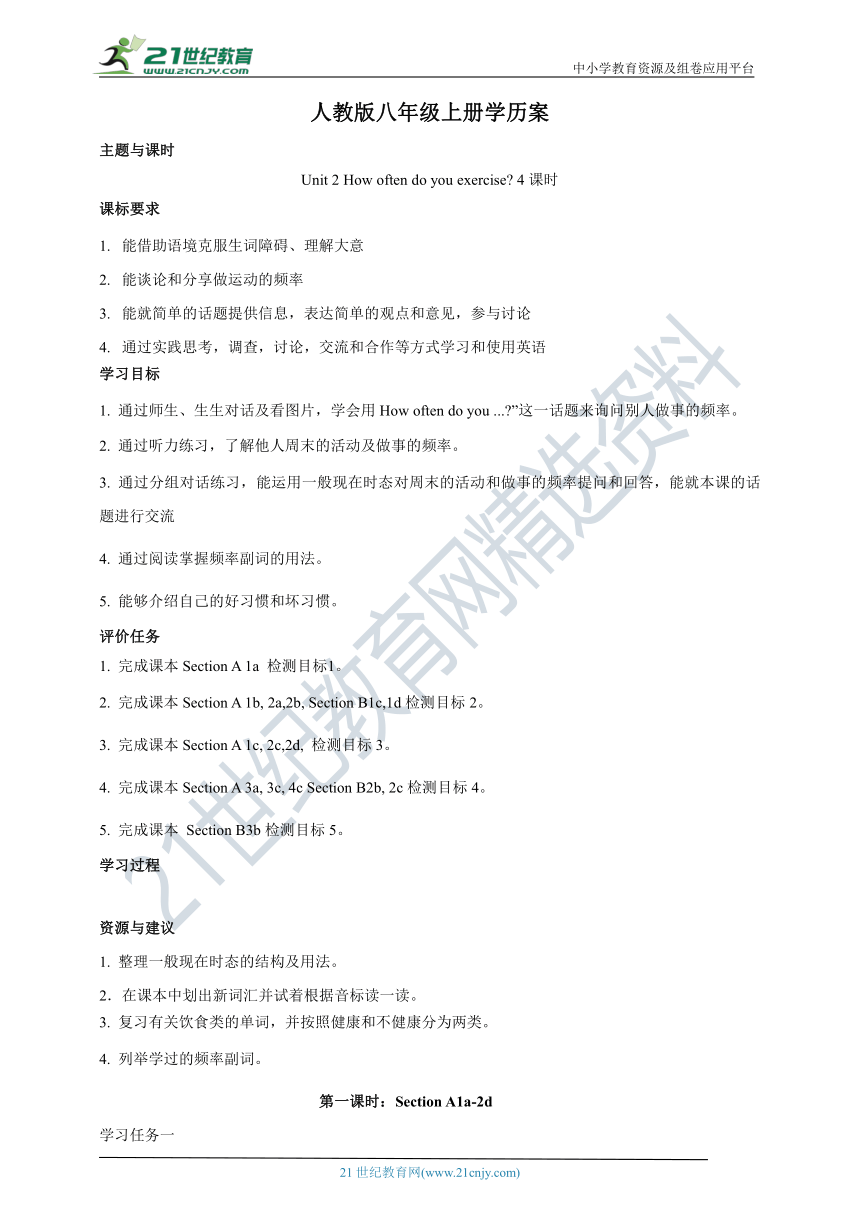 | |
| 格式 | doc | ||
| 文件大小 | 1.4MB | ||
| 资源类型 | 试卷 | ||
| 版本资源 | 人教新目标(Go for it)版 | ||
| 科目 | 英语 | ||
| 更新时间 | 2022-08-29 08:51:36 | ||
图片预览

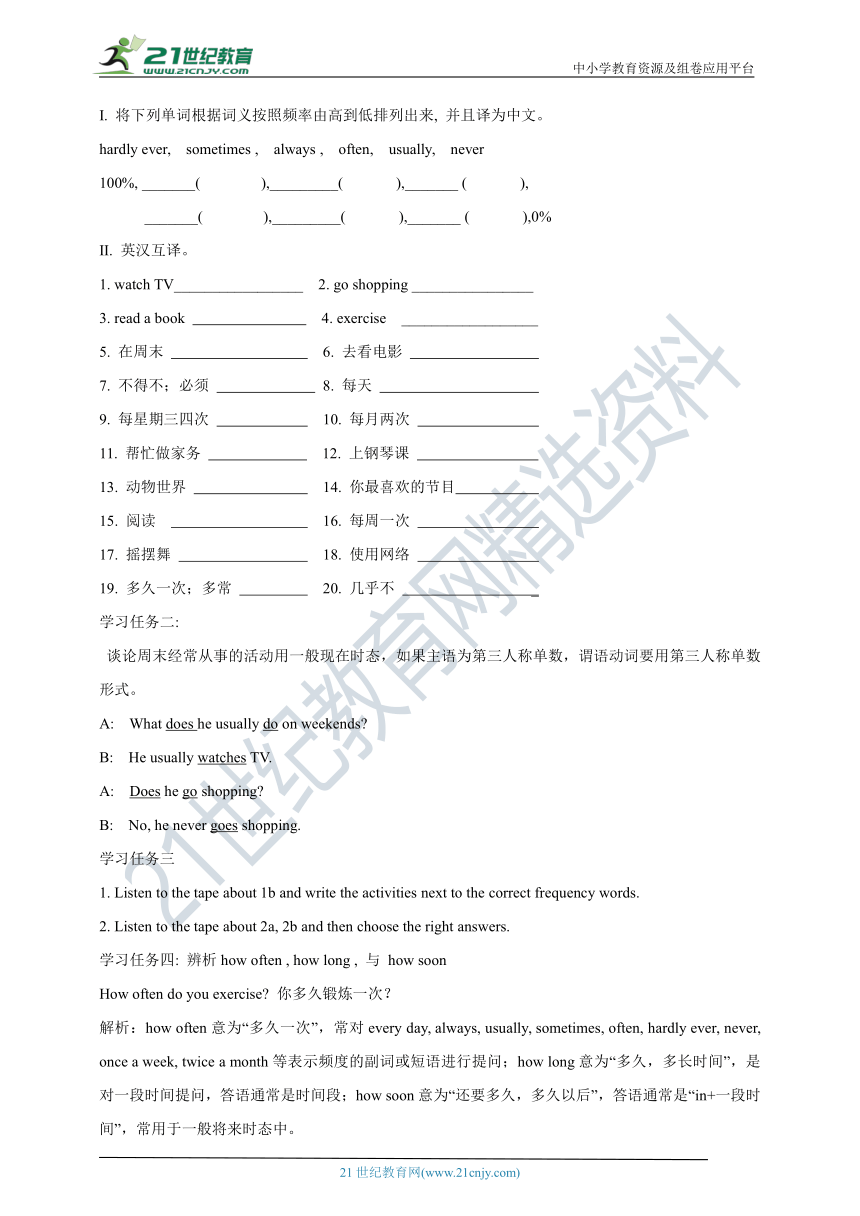
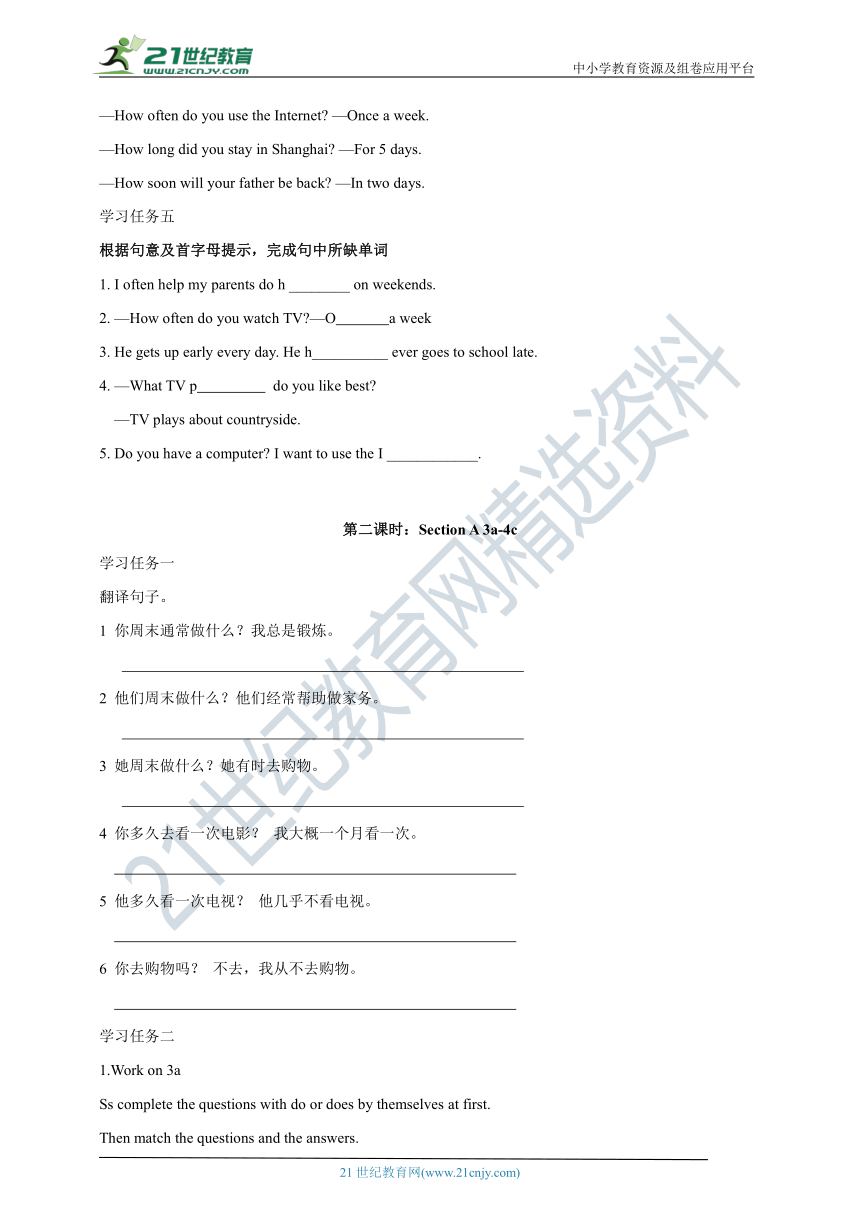
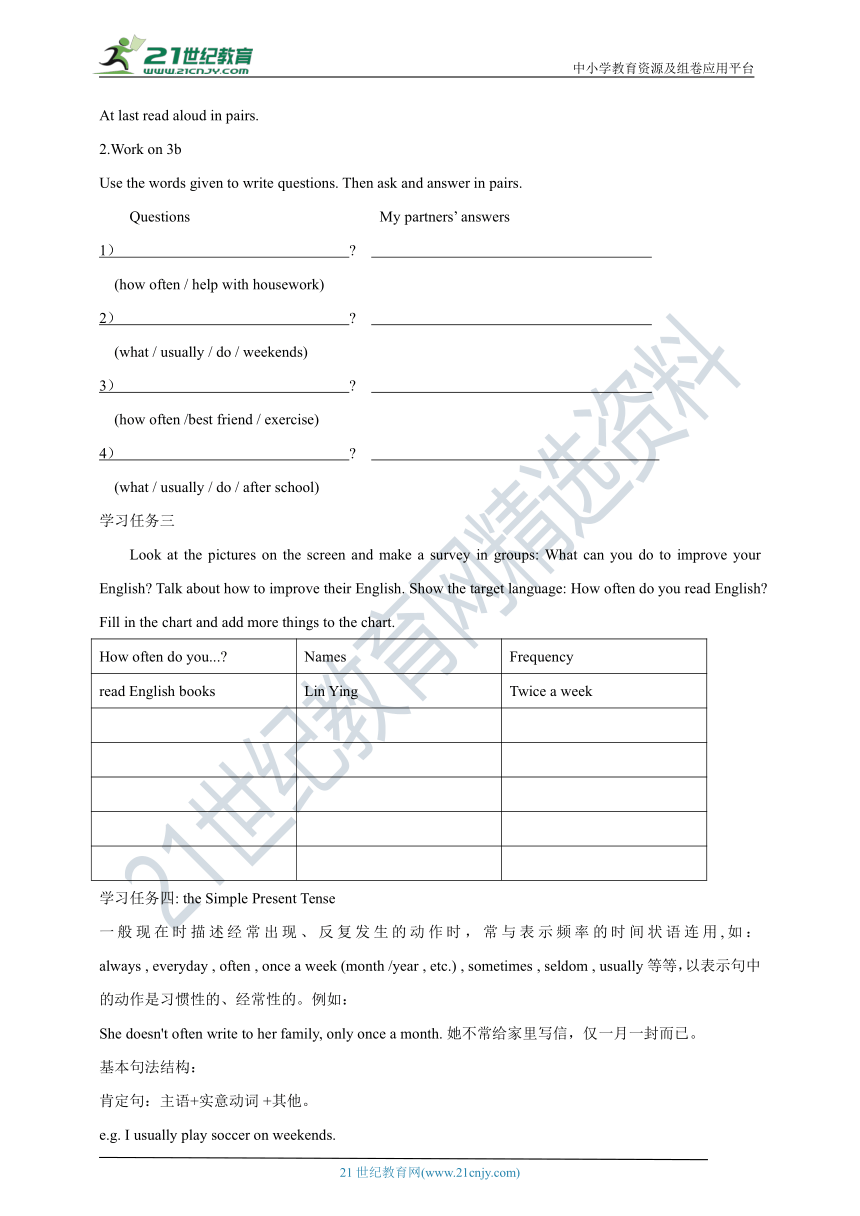
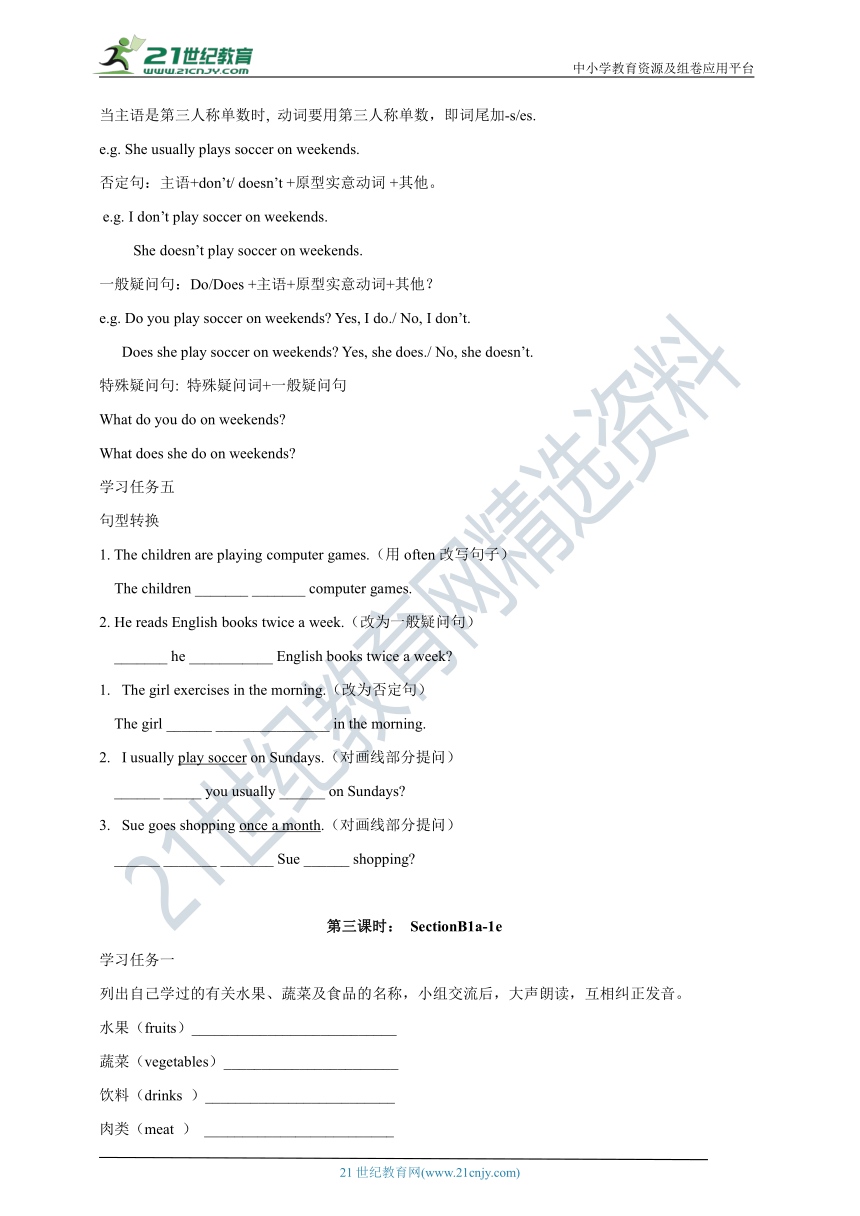
文档简介
中小学教育资源及组卷应用平台
人教版八年级上册学历案
主题与课时
Unit 2 How often do you exercise 4课时
课标要求
能借助语境克服生词障碍、理解大意
能谈论和分享做运动的频率
能就简单的话题提供信息,表达简单的观点和意见,参与讨论
通过实践思考,调查,讨论,交流和合作等方式学习和使用英语
学习目标
1. 通过师生、生生对话及看图片,学会用How often do you ... ”这一话题来询问别人做事的频率。
2. 通过听力练习,了解他人周末的活动及做事的频率。
3. 通过分组对话练习,能运用一般现在时态对周末的活动和做事的频率提问和回答,能就本课的话题进行交流
4. 通过阅读掌握频率副词的用法。
5. 能够介绍自己的好习惯和坏习惯。
评价任务
1. 完成课本Section A 1a 检测目标1。
2. 完成课本Section A 1b, 2a,2b, Section B1c,1d检测目标2。
3. 完成课本Section A 1c, 2c,2d, 检测目标3。
4. 完成课本Section A 3a, 3c, 4c Section B2b, 2c检测目标4。
5. 完成课本 Section B3b检测目标5。
学习过程
资源与建议
1. 整理一般现在时态的结构及用法。
2.在课本中划出新词汇并试着根据音标读一读。
3. 复习有关饮食类的单词,并按照健康和不健康分为两类。
4. 列举学过的频率副词。
第一课时:Section A1a-2d
学习任务一
I. 将下列单词根据词义按照频率由高到低排列出来, 并且译为中文。
hardly ever, sometimes , always , often, usually, never
100%, _______( ),_________( ),_______ ( ),
_______( ),_________( ),_______ ( ),0%
II. 英汉互译。
1. watch TV_________________ 2. go shopping ________________
3. read a book 4. exercise __________________
5. 在周末 6. 去看电影
7. 不得不;必须 8. 每天
9. 每星期三四次 10. 每月两次
11. 帮忙做家务 12. 上钢琴课
13. 动物世界 14. 你最喜欢的节目
15. 阅读 16. 每周一次
17. 摇摆舞 18. 使用网络
19. 多久一次;多常 20. 几乎不 _
学习任务二:
谈论周末经常从事的活动用一般现在时态,如果主语为第三人称单数,谓语动词要用第三人称单数形式。
A: What does he usually do on weekends
B: He usually watches TV.
A: Does he go shopping
B: No, he never goes shopping.
学习任务三
1. Listen to the tape about 1b and write the activities next to the correct frequency words.
2. Listen to the tape about 2a, 2b and then choose the right answers.
学习任务四: 辨析how often , how long , 与 how soon
How often do you exercise 你多久锻炼一次?
解析:how often意为“多久一次”,常对every day, always, usually, sometimes, often, hardly ever, never, once a week, twice a month等表示频度的副词或短语进行提问;how long意为“多久,多长时间”,是对一段时间提问,答语通常是时间段;how soon意为“还要多久,多久以后”,答语通常是“in+一段时间”,常用于一般将来时态中。
—How often do you use the Internet —Once a week.
—How long did you stay in Shanghai —For 5 days.
—How soon will your father be back —In two days.
学习任务五
根据句意及首字母提示,完成句中所缺单词
1. I often help my parents do h ________ on weekends.
2. —How often do you watch TV —O a week
3. He gets up early every day. He h__________ ever goes to school late.
4. —What TV p do you like best
—TV plays about countryside.
5. Do you have a computer I want to use the I ____________.
第二课时:Section A 3a-4c
学习任务一
翻译句子。
1 你周末通常做什么?我总是锻炼。
2 他们周末做什么?他们经常帮助做家务。
3 她周末做什么?她有时去购物。
4 你多久去看一次电影? 我大概一个月看一次。
5 他多久看一次电视? 他几乎不看电视。
6 你去购物吗? 不去,我从不去购物。
学习任务二
1.Work on 3a
Ss complete the questions with do or does by themselves at first.
Then match the questions and the answers.
At last read aloud in pairs.
2.Work on 3b
Use the words given to write questions. Then ask and answer in pairs.
Questions My partners’ answers
1)
(how often / help with housework)
2)
(what / usually / do / weekends)
3)
(how often /best friend / exercise)
4)
(what / usually / do / after school)
学习任务三
Look at the pictures on the screen and make a survey in groups: What can you do to improve your English Talk about how to improve their English. Show the target language: How often do you read English Fill in the chart and add more things to the chart.
How often do you... Names Frequency
read English books Lin Ying Twice a week
学习任务四: the Simple Present Tense
一般现在时描述经常出现、反复发生的动作时,常与表示频率的时间状语连用,如:always , everyday , often , once a week (month /year , etc.) , sometimes , seldom , usually等等,以表示句中的动作是习惯性的、经常性的。例如:
She doesn't often write to her family, only once a month. 她不常给家里写信,仅一月一封而已。
基本句法结构:
肯定句:主语+实意动词 +其他。
e.g. I usually play soccer on weekends.
当主语是第三人称单数时, 动词要用第三人称单数,即词尾加-s/es.
e.g. She usually plays soccer on weekends.
否定句:主语+don’t/ doesn’t +原型实意动词 +其他。
e.g. I don’t play soccer on weekends.
She doesn’t play soccer on weekends.
一般疑问句:Do/Does +主语+原型实意动词+其他?
e.g. Do you play soccer on weekends Yes, I do./ No, I don’t.
Does she play soccer on weekends Yes, she does./ No, she doesn’t.
特殊疑问句: 特殊疑问词+一般疑问句
What do you do on weekends
What does she do on weekends
学习任务五
句型转换
1. The children are playing computer games.(用often改写句子)
The children _______ _______ computer games.
2. He reads English books twice a week.(改为一般疑问句)
_______ he ___________ English books twice a week
The girl exercises in the morning.(改为否定句)
The girl ______ _______________ in the morning.
I usually play soccer on Sundays.(对画线部分提问)
______ _____ you usually ______ on Sundays
Sue goes shopping once a month.(对画线部分提问)
______ _______ _______ Sue ______ shopping
第三课时: SectionB1a-1e
学习任务一
列出自己学过的有关水果、蔬菜及食品的名称,小组交流后,大声朗读,互相纠正发音。
水果(fruits)___________________________
蔬菜(vegetables)_______________________
饮料(drinks )_________________________
肉类(meat ) _________________________
食品 (foods)__________________________
II. 写出下列单词和短语。
1 无用的东西 _ 2 咖啡 ___ 3 健康 _
4 垃圾食品 5 想要(某人)做某事
6 对…有益 7喝牛奶
学习任务二
Group work 调查一下谁是班上最健康的学生,完成下表。
What sports do you often play What do you often eat How many hours do you sleep
Lucy
总结谁是最健康的学生。
I think…is the healthiest student. He /She plays …every day. He often eats…He/She sleeps …hours every night.
学习任务三:
1. 记者正在和Lily , Bill 讨论关于他们的生活习惯。听录音,完成1c。
2. 听第二遍录音,判断所给句子的正(T)、误(F)。
(1) Tina exercises every day. ( )
(2) Tina eats vegetables every day, but she doesn’t eat fruit. ( )
(3) Bill sometimes eats vegetables, but he never eats fruit. ( )
(4) Tina and Bill both sleep nine hours every night. ( )
(5) Tina and Bill both eat junk food two or three times a week. ( )
(6) Bill drinks coffee four times a day, but Tina doesn’t drink it. ( )
3. 听两遍对话,完成1d。Check like this:
A: How often does Lily exercise B: She exercises every day.
模仿秀:跟读录音,模仿语音语调。
学习任务四
1. But my mother wants me to drink it. 但我妈妈想要我喝它。
want sb. to do sth. 想要某人做某事=would like to do sth.
2. be good for 意为“对…有好处”, 其反义词为 be bad for “对......有害”。 当表示 “擅长某一学科知识或某种技能 “或”在…方面做得好”时, 我们用be good at “擅长” , 其后跟动词的-ing形式. be good to 表示“对......好”, 其中good 可用friendly 代替。be good with sb. 表示“与某人相处得好”
学习任务五
根据首字母提示完成单词。
1. I eat fruit every day and I love j______ food, too.
2. C is my favorite drink.
3. We need h food.
4. How often do you eat v___________
5. Breakfast is really good for your h________.
第四课时:Section B 2a-Self check
学习任务一
请判断下列习惯是否健康,健康的请写上“healthy”, 不健康的请写上“unhealthy”。
1. He exercises at least (至少)four or five days a week.( )
2. He always drinks cola before lunch. ( )
3. She eats junk food every day. ( )
4. She eats vegetables only twice a week. ( )
5. He tries to drink milk every day. ( )
学习任务二 Reading
1. Skimming (略读): 快速阅读文章,完成段落与段落大意连线。
Paragraph ① about exercising
Paragraph ② about watching television
Paragraph ③ here are the results.
Paragraph ④ about using the Internet
Paragraph ⑤ the best way to relax
2. Scanning (找读):
Task 1 Read the text and finish 2b.
Task 2 Read the text again and finish 2c.
3.根据课文原文填空
It is good to relax 1______using the Internet 2______watching game show, but we think the best way to relax is 3______exercise. It is healthy for the 4______and the body. Exercise 5______as playing 6______is fun, and you can 7______time with your friends and family as you play 8______.
And remember, “Old habits 9______hard.” So start exercising 10______it’s too late.
学习任务三
1. Although many students like to watch sports, game shows are the most popular.
although是连词,意为“虽然、尽管”,引导让步状语从句,可以与though互换,但不能与but同时出现在一个句子中。也就是说,在同一个句子中,有although就没有but,反之亦然。
e.g. Although He is ill, he goes on working.=He is ill, but he goes on working.
2. It’s good to relax by using the Internet or watching game shows, but we think the best way to relax is through exercise. 通过上网和看游戏类节目来放松没错,但我们认为最好的放松方式还是通过锻炼。此句是“It’s + adj. (for sb.) to do sth.(对某人来说)做某事是……的”,it作形式主语,真正的主语是后面的动词不定式。e.g. It’s important(for us) to learn English well.
3. be afraid害怕 be afraid to do sth.害怕做某事 be afraid of doing sth.害怕做某事
be afraid of sb./sth. 害怕某人/某物 be afraid+that从句: 担心……,恐怕……
4. worry about=be worried about 担心、担忧
5. a 16-year-old student一个16岁的学生
复合形容词构成:数词–可数名词单数–形容词
e.g. She is an 8-year-old girl. This is a 1000-word-long letter.
学习任务四
用所给词的适当形式填空。
1 Most students exercise three or four______________(time) a week.
2. Tom play baseball_______________(two) a week.
3. He spends at________________ (little) one hour in reading every day.
4._______________(drink) milk every day is good for your health.
5. It is good to relax by________________(use) the Internet or watching game shows.
课堂检测
检测一:
根据对话内容,从方框中选择恰当的选项补全对话,其中有两项多余。
A: Hello, Jill. (1) _______
B: No, I’m quite busy.
A: Really
B: Yes. I have two music lessons and I have lots of homework to do.
A: (2) _______
B: Three times a week, on Monday, Thursday and Saturday.
A: (3) _______
B: Pop music.
A: (4) _______
B: No, I’m not.
A: Great! (5) _______
B: Sure. I want to go there to relax.
A. What kind of music are you learning B. Are you free this Saturday C. What can you do D. Can you go to the beach with me E. How often do you have music lessons F. Do you want to be a music teacher G. Well, are you busy this Sunday
检测二:
句型转换。
1. Mr. Green often goes fishing on weekends. (改为一般疑问句)
_________ Mr. Green often _________ fishing on weekends
2. Does your uncle eat vegetables every day (补全肯定答语)
Yes, _________ _________.
3. The Smiths visit their friends twice a week. (对划线部分提问)
_________ _________ _________ the Smiths visit their friends
4. Mr. Smith sleeps seven hours every night. (对划线部分提问)
_________ _________ _________ does Mr. Smith sleep every night
5. My grandma exercises in the park every afternoon. (对划线部分提问)
_________ _________ your grandma _________ in the park every afternoon
检测三:
用所给词的适当形式填空。
1. Exercise such as________________(play) soccer is fun for us.
2. Who wants_______________(go) shopping with me this morning
3. You must eat more vegetables and keep______________(health).
4. Forty-five percent of the teachers______________(be) women in this school.
5. The best way _______________(relax) is listening to music.
检测四:Writing 下面是对一个班的学生就几个方面所做的一个调查,请就表格内容写
一篇调查报告。开头已给出
Activity Survey
Activities Every day Once or twice a week Three or four times a week
Do homework 90% 0% 10%
Exercise 15% 55% 30%
Here are the results of the students activity survey. We found that
________________________________
________________________________
________________________________
学后反思
We have learnt:
1. 一般现在时态的结构及用法:___________________________________________________________
2. 常见频率副词:______________________________________________________________________
3. 健康食品:__________________________________________________________________________
不健康食品:__________________________________________________________________________
4. 如何询问别人做事的频率及其答语?
5. 如何表达自己的好习惯与坏习惯?
答案
第一课时:
学习任务一 Ⅰ. always总是, usually通常, often经常, sometimes 有时候, hardly ever几乎不, never 从不;永远不
Ⅱ. 1 看电视 2 去购物 3 看书 4 锻炼;运动 5 on weekends, 6 go to the movies, 7 have to, 8 every day 9 three or four times a week 10 twice a month 11 help with housework, 12 have piano lessons, 13 Animal World 14 your favourite program
15 do some reading 16 once a week 17 swing dance 18 use the Internet,
19 how often, 20 hardly ever
学习任务五
1 housework 2 once 3 hardly 4 program 5 Internet
第二课时:
学习任务一:翻译句子
1 -What do you usually do on weekends?-I always exercise.
2 -What do they do on weekends -They often help with housework.
3-What does she do on weekends -She sometimes goes shopping.
4-How often do you go to the movies -I go to the movies maybe once a month.
5-How often does he watch TV -He hardly ever watches TV.
6-Do you go shopping? -No,I never go shopping.
学习任务五: 句型转换
1. often plays 2. Does read 3. doesn’t exercise 4. What do do 5. How often does go
第三课时:
学习任务一:Ⅰ. 水果(fruits): apples, pears, bananas, strawberries,
蔬菜(vegetables): cabbages, tomatoes, potatoes,
饮料(drinks) : coffee, tea, milk, cola,
肉类(meat): beef, mutton, chicken, fish, pork
食品(foods): potato chips, eggs, bread, cakes,
Ⅱ. 1 junk 2 coffee 3 healthy 4 junk food , 5 want sb. to do sth., 6 be good for, 7 drink milk
学习任务三:TFTTFT
学习任务五:1 junk 2 Coffee/Cola 3 healthy 4 vegetables 5 health
第四课时:
学习任务一: 1 healthy 2 unhealthy 3 unhealthy 4 unhealthy 5 healthy
学习任务二:
(Paragraph ① about exercising
Paragraph ② about watching television
Paragraph ③ here are the results.
Paragraph ④ about using the Internet
Paragraph ⑤ the best way to relax)
1 by 2 or 3 through 4 mind 5 such 6 sports 7 spend 8 together 9 die 10 before
学习任务四:1 times 2 twice 3 least 4 Drinking 5 using
课堂检测
检测一: BEAGD
检测二:1. Yes, he does.
2. Five times a week.
3. Eight.
4. Hardly ever.
5. No, he doesn’t.
检测三: 1 playing 2 to go 3 healthy 4 are 5 to relax
检测四: Here are the results of the students activity survey. We found that only fifteen percent of the students exercise every day. Fifty-five percent exercise once or twice a week. Thirty percent exercise three or four times a week.
We all know that our students must do homework, but we were surprised that ninety percent of the students do homework every day. The other ten percent do it three or four times a week. None do homework once or twice a week.
21世纪教育网 www.21cnjy.com 精品试卷·第 2 页 (共 2 页)
HYPERLINK "http://21世纪教育网(www.21cnjy.com)
" 21世纪教育网(www.21cnjy.com)
人教版八年级上册学历案
主题与课时
Unit 2 How often do you exercise 4课时
课标要求
能借助语境克服生词障碍、理解大意
能谈论和分享做运动的频率
能就简单的话题提供信息,表达简单的观点和意见,参与讨论
通过实践思考,调查,讨论,交流和合作等方式学习和使用英语
学习目标
1. 通过师生、生生对话及看图片,学会用How often do you ... ”这一话题来询问别人做事的频率。
2. 通过听力练习,了解他人周末的活动及做事的频率。
3. 通过分组对话练习,能运用一般现在时态对周末的活动和做事的频率提问和回答,能就本课的话题进行交流
4. 通过阅读掌握频率副词的用法。
5. 能够介绍自己的好习惯和坏习惯。
评价任务
1. 完成课本Section A 1a 检测目标1。
2. 完成课本Section A 1b, 2a,2b, Section B1c,1d检测目标2。
3. 完成课本Section A 1c, 2c,2d, 检测目标3。
4. 完成课本Section A 3a, 3c, 4c Section B2b, 2c检测目标4。
5. 完成课本 Section B3b检测目标5。
学习过程
资源与建议
1. 整理一般现在时态的结构及用法。
2.在课本中划出新词汇并试着根据音标读一读。
3. 复习有关饮食类的单词,并按照健康和不健康分为两类。
4. 列举学过的频率副词。
第一课时:Section A1a-2d
学习任务一
I. 将下列单词根据词义按照频率由高到低排列出来, 并且译为中文。
hardly ever, sometimes , always , often, usually, never
100%, _______( ),_________( ),_______ ( ),
_______( ),_________( ),_______ ( ),0%
II. 英汉互译。
1. watch TV_________________ 2. go shopping ________________
3. read a book 4. exercise __________________
5. 在周末 6. 去看电影
7. 不得不;必须 8. 每天
9. 每星期三四次 10. 每月两次
11. 帮忙做家务 12. 上钢琴课
13. 动物世界 14. 你最喜欢的节目
15. 阅读 16. 每周一次
17. 摇摆舞 18. 使用网络
19. 多久一次;多常 20. 几乎不 _
学习任务二:
谈论周末经常从事的活动用一般现在时态,如果主语为第三人称单数,谓语动词要用第三人称单数形式。
A: What does he usually do on weekends
B: He usually watches TV.
A: Does he go shopping
B: No, he never goes shopping.
学习任务三
1. Listen to the tape about 1b and write the activities next to the correct frequency words.
2. Listen to the tape about 2a, 2b and then choose the right answers.
学习任务四: 辨析how often , how long , 与 how soon
How often do you exercise 你多久锻炼一次?
解析:how often意为“多久一次”,常对every day, always, usually, sometimes, often, hardly ever, never, once a week, twice a month等表示频度的副词或短语进行提问;how long意为“多久,多长时间”,是对一段时间提问,答语通常是时间段;how soon意为“还要多久,多久以后”,答语通常是“in+一段时间”,常用于一般将来时态中。
—How often do you use the Internet —Once a week.
—How long did you stay in Shanghai —For 5 days.
—How soon will your father be back —In two days.
学习任务五
根据句意及首字母提示,完成句中所缺单词
1. I often help my parents do h ________ on weekends.
2. —How often do you watch TV —O a week
3. He gets up early every day. He h__________ ever goes to school late.
4. —What TV p do you like best
—TV plays about countryside.
5. Do you have a computer I want to use the I ____________.
第二课时:Section A 3a-4c
学习任务一
翻译句子。
1 你周末通常做什么?我总是锻炼。
2 他们周末做什么?他们经常帮助做家务。
3 她周末做什么?她有时去购物。
4 你多久去看一次电影? 我大概一个月看一次。
5 他多久看一次电视? 他几乎不看电视。
6 你去购物吗? 不去,我从不去购物。
学习任务二
1.Work on 3a
Ss complete the questions with do or does by themselves at first.
Then match the questions and the answers.
At last read aloud in pairs.
2.Work on 3b
Use the words given to write questions. Then ask and answer in pairs.
Questions My partners’ answers
1)
(how often / help with housework)
2)
(what / usually / do / weekends)
3)
(how often /best friend / exercise)
4)
(what / usually / do / after school)
学习任务三
Look at the pictures on the screen and make a survey in groups: What can you do to improve your English Talk about how to improve their English. Show the target language: How often do you read English Fill in the chart and add more things to the chart.
How often do you... Names Frequency
read English books Lin Ying Twice a week
学习任务四: the Simple Present Tense
一般现在时描述经常出现、反复发生的动作时,常与表示频率的时间状语连用,如:always , everyday , often , once a week (month /year , etc.) , sometimes , seldom , usually等等,以表示句中的动作是习惯性的、经常性的。例如:
She doesn't often write to her family, only once a month. 她不常给家里写信,仅一月一封而已。
基本句法结构:
肯定句:主语+实意动词 +其他。
e.g. I usually play soccer on weekends.
当主语是第三人称单数时, 动词要用第三人称单数,即词尾加-s/es.
e.g. She usually plays soccer on weekends.
否定句:主语+don’t/ doesn’t +原型实意动词 +其他。
e.g. I don’t play soccer on weekends.
She doesn’t play soccer on weekends.
一般疑问句:Do/Does +主语+原型实意动词+其他?
e.g. Do you play soccer on weekends Yes, I do./ No, I don’t.
Does she play soccer on weekends Yes, she does./ No, she doesn’t.
特殊疑问句: 特殊疑问词+一般疑问句
What do you do on weekends
What does she do on weekends
学习任务五
句型转换
1. The children are playing computer games.(用often改写句子)
The children _______ _______ computer games.
2. He reads English books twice a week.(改为一般疑问句)
_______ he ___________ English books twice a week
The girl exercises in the morning.(改为否定句)
The girl ______ _______________ in the morning.
I usually play soccer on Sundays.(对画线部分提问)
______ _____ you usually ______ on Sundays
Sue goes shopping once a month.(对画线部分提问)
______ _______ _______ Sue ______ shopping
第三课时: SectionB1a-1e
学习任务一
列出自己学过的有关水果、蔬菜及食品的名称,小组交流后,大声朗读,互相纠正发音。
水果(fruits)___________________________
蔬菜(vegetables)_______________________
饮料(drinks )_________________________
肉类(meat ) _________________________
食品 (foods)__________________________
II. 写出下列单词和短语。
1 无用的东西 _ 2 咖啡 ___ 3 健康 _
4 垃圾食品 5 想要(某人)做某事
6 对…有益 7喝牛奶
学习任务二
Group work 调查一下谁是班上最健康的学生,完成下表。
What sports do you often play What do you often eat How many hours do you sleep
Lucy
总结谁是最健康的学生。
I think…is the healthiest student. He /She plays …every day. He often eats…He/She sleeps …hours every night.
学习任务三:
1. 记者正在和Lily , Bill 讨论关于他们的生活习惯。听录音,完成1c。
2. 听第二遍录音,判断所给句子的正(T)、误(F)。
(1) Tina exercises every day. ( )
(2) Tina eats vegetables every day, but she doesn’t eat fruit. ( )
(3) Bill sometimes eats vegetables, but he never eats fruit. ( )
(4) Tina and Bill both sleep nine hours every night. ( )
(5) Tina and Bill both eat junk food two or three times a week. ( )
(6) Bill drinks coffee four times a day, but Tina doesn’t drink it. ( )
3. 听两遍对话,完成1d。Check like this:
A: How often does Lily exercise B: She exercises every day.
模仿秀:跟读录音,模仿语音语调。
学习任务四
1. But my mother wants me to drink it. 但我妈妈想要我喝它。
want sb. to do sth. 想要某人做某事=would like to do sth.
2. be good for 意为“对…有好处”, 其反义词为 be bad for “对......有害”。 当表示 “擅长某一学科知识或某种技能 “或”在…方面做得好”时, 我们用be good at “擅长” , 其后跟动词的-ing形式. be good to 表示“对......好”, 其中good 可用friendly 代替。be good with sb. 表示“与某人相处得好”
学习任务五
根据首字母提示完成单词。
1. I eat fruit every day and I love j______ food, too.
2. C is my favorite drink.
3. We need h food.
4. How often do you eat v___________
5. Breakfast is really good for your h________.
第四课时:Section B 2a-Self check
学习任务一
请判断下列习惯是否健康,健康的请写上“healthy”, 不健康的请写上“unhealthy”。
1. He exercises at least (至少)four or five days a week.( )
2. He always drinks cola before lunch. ( )
3. She eats junk food every day. ( )
4. She eats vegetables only twice a week. ( )
5. He tries to drink milk every day. ( )
学习任务二 Reading
1. Skimming (略读): 快速阅读文章,完成段落与段落大意连线。
Paragraph ① about exercising
Paragraph ② about watching television
Paragraph ③ here are the results.
Paragraph ④ about using the Internet
Paragraph ⑤ the best way to relax
2. Scanning (找读):
Task 1 Read the text and finish 2b.
Task 2 Read the text again and finish 2c.
3.根据课文原文填空
It is good to relax 1______using the Internet 2______watching game show, but we think the best way to relax is 3______exercise. It is healthy for the 4______and the body. Exercise 5______as playing 6______is fun, and you can 7______time with your friends and family as you play 8______.
And remember, “Old habits 9______hard.” So start exercising 10______it’s too late.
学习任务三
1. Although many students like to watch sports, game shows are the most popular.
although是连词,意为“虽然、尽管”,引导让步状语从句,可以与though互换,但不能与but同时出现在一个句子中。也就是说,在同一个句子中,有although就没有but,反之亦然。
e.g. Although He is ill, he goes on working.=He is ill, but he goes on working.
2. It’s good to relax by using the Internet or watching game shows, but we think the best way to relax is through exercise. 通过上网和看游戏类节目来放松没错,但我们认为最好的放松方式还是通过锻炼。此句是“It’s + adj. (for sb.) to do sth.(对某人来说)做某事是……的”,it作形式主语,真正的主语是后面的动词不定式。e.g. It’s important(for us) to learn English well.
3. be afraid害怕 be afraid to do sth.害怕做某事 be afraid of doing sth.害怕做某事
be afraid of sb./sth. 害怕某人/某物 be afraid+that从句: 担心……,恐怕……
4. worry about=be worried about 担心、担忧
5. a 16-year-old student一个16岁的学生
复合形容词构成:数词–可数名词单数–形容词
e.g. She is an 8-year-old girl. This is a 1000-word-long letter.
学习任务四
用所给词的适当形式填空。
1 Most students exercise three or four______________(time) a week.
2. Tom play baseball_______________(two) a week.
3. He spends at________________ (little) one hour in reading every day.
4._______________(drink) milk every day is good for your health.
5. It is good to relax by________________(use) the Internet or watching game shows.
课堂检测
检测一:
根据对话内容,从方框中选择恰当的选项补全对话,其中有两项多余。
A: Hello, Jill. (1) _______
B: No, I’m quite busy.
A: Really
B: Yes. I have two music lessons and I have lots of homework to do.
A: (2) _______
B: Three times a week, on Monday, Thursday and Saturday.
A: (3) _______
B: Pop music.
A: (4) _______
B: No, I’m not.
A: Great! (5) _______
B: Sure. I want to go there to relax.
A. What kind of music are you learning B. Are you free this Saturday C. What can you do D. Can you go to the beach with me E. How often do you have music lessons F. Do you want to be a music teacher G. Well, are you busy this Sunday
检测二:
句型转换。
1. Mr. Green often goes fishing on weekends. (改为一般疑问句)
_________ Mr. Green often _________ fishing on weekends
2. Does your uncle eat vegetables every day (补全肯定答语)
Yes, _________ _________.
3. The Smiths visit their friends twice a week. (对划线部分提问)
_________ _________ _________ the Smiths visit their friends
4. Mr. Smith sleeps seven hours every night. (对划线部分提问)
_________ _________ _________ does Mr. Smith sleep every night
5. My grandma exercises in the park every afternoon. (对划线部分提问)
_________ _________ your grandma _________ in the park every afternoon
检测三:
用所给词的适当形式填空。
1. Exercise such as________________(play) soccer is fun for us.
2. Who wants_______________(go) shopping with me this morning
3. You must eat more vegetables and keep______________(health).
4. Forty-five percent of the teachers______________(be) women in this school.
5. The best way _______________(relax) is listening to music.
检测四:Writing 下面是对一个班的学生就几个方面所做的一个调查,请就表格内容写
一篇调查报告。开头已给出
Activity Survey
Activities Every day Once or twice a week Three or four times a week
Do homework 90% 0% 10%
Exercise 15% 55% 30%
Here are the results of the students activity survey. We found that
________________________________
________________________________
________________________________
学后反思
We have learnt:
1. 一般现在时态的结构及用法:___________________________________________________________
2. 常见频率副词:______________________________________________________________________
3. 健康食品:__________________________________________________________________________
不健康食品:__________________________________________________________________________
4. 如何询问别人做事的频率及其答语?
5. 如何表达自己的好习惯与坏习惯?
答案
第一课时:
学习任务一 Ⅰ. always总是, usually通常, often经常, sometimes 有时候, hardly ever几乎不, never 从不;永远不
Ⅱ. 1 看电视 2 去购物 3 看书 4 锻炼;运动 5 on weekends, 6 go to the movies, 7 have to, 8 every day 9 three or four times a week 10 twice a month 11 help with housework, 12 have piano lessons, 13 Animal World 14 your favourite program
15 do some reading 16 once a week 17 swing dance 18 use the Internet,
19 how often, 20 hardly ever
学习任务五
1 housework 2 once 3 hardly 4 program 5 Internet
第二课时:
学习任务一:翻译句子
1 -What do you usually do on weekends?-I always exercise.
2 -What do they do on weekends -They often help with housework.
3-What does she do on weekends -She sometimes goes shopping.
4-How often do you go to the movies -I go to the movies maybe once a month.
5-How often does he watch TV -He hardly ever watches TV.
6-Do you go shopping? -No,I never go shopping.
学习任务五: 句型转换
1. often plays 2. Does read 3. doesn’t exercise 4. What do do 5. How often does go
第三课时:
学习任务一:Ⅰ. 水果(fruits): apples, pears, bananas, strawberries,
蔬菜(vegetables): cabbages, tomatoes, potatoes,
饮料(drinks) : coffee, tea, milk, cola,
肉类(meat): beef, mutton, chicken, fish, pork
食品(foods): potato chips, eggs, bread, cakes,
Ⅱ. 1 junk 2 coffee 3 healthy 4 junk food , 5 want sb. to do sth., 6 be good for, 7 drink milk
学习任务三:TFTTFT
学习任务五:1 junk 2 Coffee/Cola 3 healthy 4 vegetables 5 health
第四课时:
学习任务一: 1 healthy 2 unhealthy 3 unhealthy 4 unhealthy 5 healthy
学习任务二:
(Paragraph ① about exercising
Paragraph ② about watching television
Paragraph ③ here are the results.
Paragraph ④ about using the Internet
Paragraph ⑤ the best way to relax)
1 by 2 or 3 through 4 mind 5 such 6 sports 7 spend 8 together 9 die 10 before
学习任务四:1 times 2 twice 3 least 4 Drinking 5 using
课堂检测
检测一: BEAGD
检测二:1. Yes, he does.
2. Five times a week.
3. Eight.
4. Hardly ever.
5. No, he doesn’t.
检测三: 1 playing 2 to go 3 healthy 4 are 5 to relax
检测四: Here are the results of the students activity survey. We found that only fifteen percent of the students exercise every day. Fifty-five percent exercise once or twice a week. Thirty percent exercise three or four times a week.
We all know that our students must do homework, but we were surprised that ninety percent of the students do homework every day. The other ten percent do it three or four times a week. None do homework once or twice a week.
21世纪教育网 www.21cnjy.com 精品试卷·第 2 页 (共 2 页)
HYPERLINK "http://21世纪教育网(www.21cnjy.com)
" 21世纪教育网(www.21cnjy.com)
同课章节目录
- Unit 1 Where did you go on vacation?
- Section A
- Section B
- Unit 2 How often do you exercise?
- Section A
- Section B
- Unit 3 I'm more outgoing than my sister.
- Section A
- Section B
- Unit 4 What's the best movie theater?
- Section A
- Section B
- Unit 5 Do you want to watch a game show?
- Section A
- Section B
- Unit 6 I'm going to study computer science.
- Section A
- Section B
- Unit 7 Will people have robots?
- Section A
- Section B
- Unit 8 How do you make a banana milk shake?
- Section A
- Section B
- Unit 9 Can you come to my party?
- Section A
- Section B
- Unit 10 If you go to the party, you'll have a grea
- Section A
- Section B
